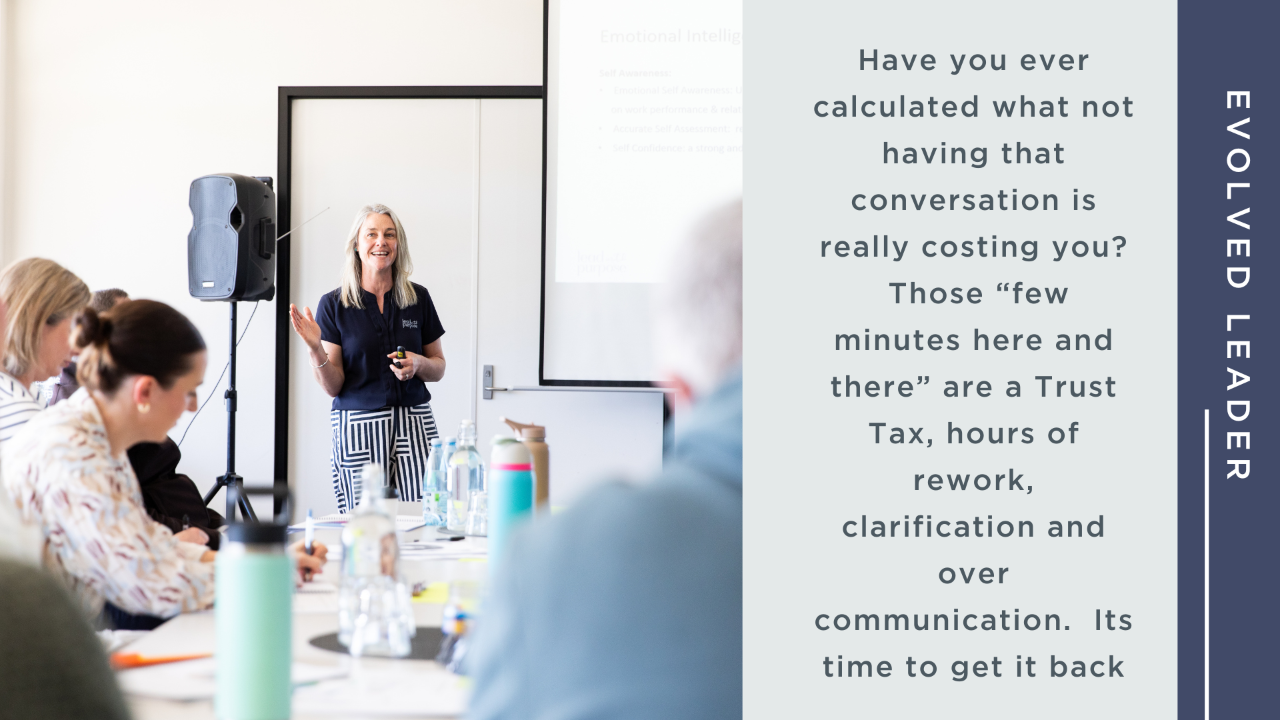Stop Paying the Trust Tax
Nov 13, 2025
Do you have one relationship in your team that’s low on trust? What is it costing you?
Last week in a workshop, a leader admitted they were putting off a hard conversation with one team member, who has depleted their trust account. We talked about the cost of a relationship that is low on trust: extra clarifications, duplicate checks “just to be safe”, a huddle after the meeting to redo the plan, and the mental loop of rehearsing what they need to say to ensure clear expectations every time.
If you add it all up, it takes hours out of your days and weeks. That is the Trust Tax: the hidden time, energy and rework you pay when trust is low.
What the Trust Tax really is (and why it grows when you delay)
Low trust changes how work flows and people behave. People will start to overcompensate, over-specify, cc more stakeholders, and double-handle tasks. Leaders stall on decisions or hold the floor too long because they’re managing risk rather than the work. None of this shows up on a productivity measure, but it impacts cycle time and morale.
When this happens, our brain is doing exactly what it was designed to do under uncertainty: it shifts into threat monitoring. Cortisol rises, and we start wanting certainty over speed. That means more checks, more explanations and more over thinking. The less predictable the relationship, the more our brain insists on insurance or a back up plan which may look like meetings after the meeting, “just to check” actions, progress parked until the leader confirms. This doesn’t happen just once. Multiply that by days and across jobs, and you’ve got a quiet tax draining your decision making.
Know what the cost is
As leaders most of our decision making is based on data and facts. What if you could apply this to the trust tax to know what it is really costing you. For the next week, keep a simple Trust Tax Ledger for that one relationship:
- Note the amount of time you spend ensuring there are extra clarifications (“Just to confirm…”),
- How long do you spend completing duplicate checks or workarounds you wouldn’t do with a high-trust colleague?
- Rework: redoing, re-explaining, re-briefing or fixing, how much time is this absorbing?
- Escalations and cc chains created to compensate for low trust,
- Over thinking time catch yourself: “I’m still thinking about them and what could go wrong” = minutes on the clock.
At week’s end, total the minutes, work out the total hours and a rough cost to your time. Now add what you didn’t do while paying that tax, planning, coaching, strategic work. The number should make inaction feel more expensive than addressing it.
Where we change our behaviours and inadvertently increase the tax
- Inconsistent updates. Changing channel/time, or going silent waiting to see what will happen, this can create situations where others need to chase information,
- Tolerating one exception. When one person is allowed to miss deadlines or be careless with commitments, everyone else starts building workarounds,
- Public corrections, private praise (reversed). You push the person into face-saving mode; they’ll protect themselves with process and paper.
Every one of these is reversible, and when you reverse them, you reduce the tax.
How to stop the Trust Tax: your 3 step, leader-led approach
Think Calculate, Conversation & Confirm, with disciplined follow-through.
Calculate (you’ve done it): show yourself the true cost. Pick one high-leverage pattern to address: missed handovers, late replies, partial work, taking shortcuts on quality of completion, be specific.
Conversation: Book a short conversation. Keep it specific: behaviour, impact, agreed actions to move forward. Engage the person in the conversation.
Confirm: What am I missing? Can you meet this? If not, what support do you need from me?
Notice the balance: you set a clear standard, you remove ambiguity that inflates tax, and you agree on the actions. Trust is always two-way.
- The other part to confirm is to look at the evidence, (not based on feel) and make trust predictable. Close the loop on tasks, follow up is critical if you are going to hold up your end of the trust deal, even if there is no change. Track the agreed behaviour so progress is visible.
Agree on a time for a review: what improved, what didn’t, what one tweak would remove more tax? Commit, then keep going.
Keep the trust jar full
Trust is not built through behaviour or accountability campaigns. Its built-on predictability and consistency.
- Set times and frequency for updates,
- Following through,
- Transparency when something doesn’t go to plan,
- Clear communication of the why behind decisions.
Do these small things consistently to hold up your side of the trust equation.
Know the Real Cost, then choose
Avoiding one conversation can feel cheaper than having it. It isn’t. If your ledger shows even 1-2 hours a week lost, you’re already paying more than the price of a calm, clear, reset plus gathering the evidence. As a leader you aren’t paid to absorb hidden costs; you’re paid to remove them. Calculate first, have the conversation and confirm to put those hours back where they belong.
Get Evolved Leader delivered to your inbox every week to receive effective tools and practical ideas you can implement to develop your own leadership skills and style as well as those in your team.
We hate SPAM. We will never sell your information, for any reason.


